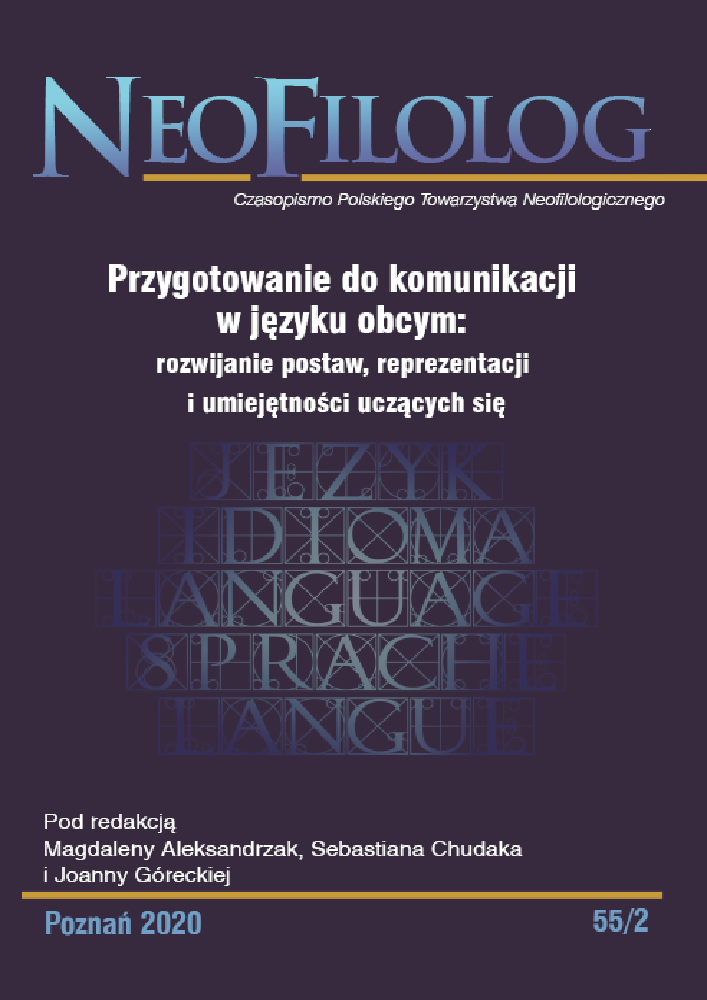Abstract
The main of this article is to present the results of a pilot study carried out among 476 students of selected foreign languages at Warsaw University. The research covered the following issues: (1) students’ interest in various courses included in philology studies (literature, linguistics, foreign language didactics, etc.); (2) the dominant motivation for undertaking philological studies and (3) students’ initial career plans. The research is diagnostic and descriptive and it will be continued at over a dozen Polish universities. The main goal of this project is to build a social representation of foreign language studies in Poland today. The Polish Association of Modern Languages (PTN) is a patron of the study.
References
Baran-Łucarz M. (2014), Podejście studentów filologii angielskiej do refleksji w nauce wymowy. „Neofilolog”, nr 42/1, s. 9–23
Biernacka-Licznar K. (2013), Narracyjne studium życia na przykładzie studentów Wydziału Filologicznego Uniwersytetu Wrocławskiego. „Italica Wratislaviensia”, nr 4, s. 9–27.
Dańko M., Wieszczeczyńska E. (2013), Wymogi współczesnego rynku pracy w odniesieniu do kompetencji absolwentów kierunków humanistycznych. „Neofilolog”, nr 40/1, s. 43–57.
Jaroszewska A. (2014), Sukces w nauce języka obcego w opinii studentów pierwszego roku warszawskiej germanistyki, (w:) Karpeta-Peć B., Kucharczyk R., Smuk M., Torenc M. (red.), Wyznaczniki sukcesu nauczyciela i ucznia w glottodydaktyce. Warszawa: Instytut Germanistyki i Instytut Romanistyki Uniwersytetu Warszawskiego, s. 283–294.
Lankiewicz H. (2013), Filologiczna praca licencjacka a rozwój kompetencji naukowych studenta. „Neofilolog”, nr 40/1, s. 111–125.
Nerlicki K. (2014), O sukcesach z perspektywy studentów germanistyki, którzy boją się mówić, (w:) Karpeta-Peć B., Kucharczyk R., Smuk M., Torenc M. (red.), Wyznaczniki sukcesu nauczyciela i ucznia w glottodydaktyce. Warszawa: Instytut Germanistyki i Instytut Romanistyki Uniwersytetu Warszawskiego, s. 295–306.
Paprocka-Piotrowska U., Knieja J. (2009), Motywacje studentów neofilologii: od kandydata do absolwenta. „Przegląd Glottodydaktyczny”, nr 26, s. 159–172.
Pawlak M., Mystkowska-Wiertelak A., Bielak J. (2014), Przekonania studentów filologii angielskiej na temat nauczania gramatyki. „Neofilolog”, nr 42/1, s. 77–93.
Pudo D. (2017), Subiektywne teorie na temat uczenia się języka obcego studentów romanistyki. „Neofilolog”, nr 48/1, s. 55–71.
Sowa M., Mocarz-Kleindienst M., Czyżewska U. (red.) (2015), Nauczanie języków obcych na potrzeby rynku pracy. Lublin: Wydawnictwo KUL.
Werbińska D. (2012), Akwizycja języka obcego w perspektywie studenta filologii: badanie tożsamości narracyjnej studenta w kontekście czasoprzestrzeni i heteroglosji. „Neofilolog”, nr 39/1, s. 55–80.
Wróblewska-Pawlak K., Okęcka H. (2000), Socjologiczny portret studentów romanistyki UW: motywacje, wyobrażenia, plany i potrzeby, (w:) Okęcka H., Wróblewska-Pawlak K., Zając J. (red.), Le français langue étrangère à l’université – nouveaux objectifs, nouveaux besoins. Instytut Romanistyki Uniwersytetu Warszawskiego: Warszawa, s. 57–85.
License
Copyright (c) 2020 Maciej Smuk

This work is licensed under a Creative Commons Attribution-NoDerivatives 4.0 International License.
Authors
Authors of texts accepted for publication in Neofilolog are required to complete, sign and return to the Editorial team’s office the Agreement for granting a royalty-free license to works with a commitment to grant a CC sub-license.
Under the agreement, the authors of the texts published in Neofilolog grant Adam Mickiewicz University in Poznań a non-exclusive, royalty-free license and authorize the use of Attribution-NoDerivatives 4.0 International (CC BY-ND 4.0) Creative Commons sub-license.
The authors retain the right to the free disposal of the work.
Users
Interested Internet users are entitled to use works that have been published in Neofilolog since 2017, under the following conditions:
▪ attribution – obligation to provide, together with the distributed work, information about the authorship, title, source (link to the original work, DOI) and the license itself.
▪ no derivatives – the work must be preserved in its original form. Without the author's consent, it is not possible to distribute the modified work in the form of translations, publications, etc.
Copyrights are reserved for all texts published since 2017.
Miscellaneous
Adam Mickiewicz University in Poznań retains the property right as a whole (layout, graphic form, title, cover design, logo etc.).

